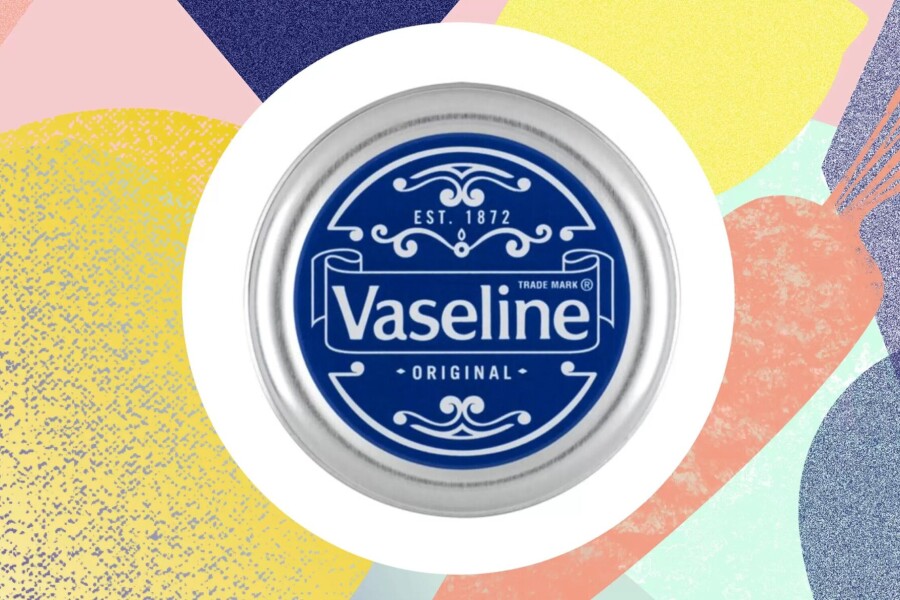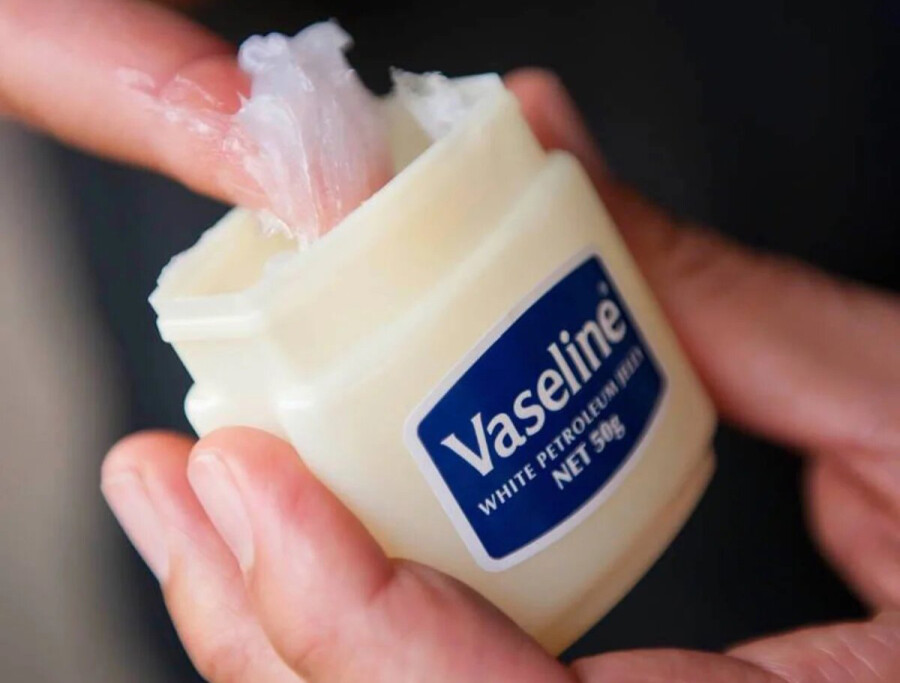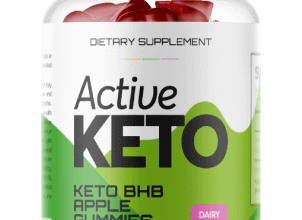
You've probably heard that products containing Vaseline and Vaseline can be used as an intimate lubricant. But is this method of moisturizing safe? and determine whether it is really suitable for the role of a substitute for an intimate lubricant.
- Why should you say no to vaseline?
- Can Vaseline be used as an anal lubricant?
- How safe is petroleum jelly?
- Which lubricant is the best alternative to petroleum jelly?
- Water-based lubricants
- Oil-based lubricants
- Silicone-based lubricants
- An alternative to Vaseline in a home cosmetic bag
- What else to replace the lubricant with
- Coconut oil
- Olive oil
- Corn starch and water
- Aloe Vera
- Vegetable oil
- Vitamin E oil
- Yogurt
- Baby oil
- Saliva
- Shampoo
- Honey
- Moisturizer
- Harmless and insidious
Why should you say no to vaseline?
Reasons why you should not use Vaseline instead of lubricant:
- Vaseline contains mineral oil, which causes irritation of the vaginal mucosa, vulva, anus – itching, burning, papular rash, redness. This increases the risk of developing a yeast infection due to scratching the skin and contact of the affected area with tissue.
- According to research, petroleum jelly is a favorable environment for the reproduction of bacteria. Women who use Vaseline on a regular basis are 2.5 times more likely to develop bacterial vaginosis or vaginitis.
- Vaseline and Vaseline-containing products destroy latex, polyisopropene, and chemical binders. membranes from which condoms and sex toys are made. Therefore, if your plans do not include pregnancy, it is better to refuse vaseline.
- The mineral oil contained in petroleum jelly reduces the effectiveness of the condom by 90% in the first minute, and completely destroys it after 2-3 minutes. The problem is especially acute during anal sex, when penetration provokes numerous microcracks in the anus.
- Vaseline is very dense in its structure, and getting it into the respiratory tract can cause coughing and suffocation. Therefore, its use as a lubricant for oral sex is prohibited.
- Vaseline, especially with a dye, can change the color of the fabric. In addition, it is not soluble in water and is difficult to wash off the skin.
- Vaseline does not provide good glide and only increases friction. In addition, it has the ability to stick to the skin and clump, which further increases the discomfort.
On the surface, Vaseline seems to be the perfect balance between minimal cost and maximum lubricity. However, in practice, everything is different. Gynecologists recommend immediately buying high-quality lubricants, and not experimenting with a budget tool.
Can Vaseline be used as an anal lubricant?
The answer to this question is definitely no. It can be used as a sedative for hemorrhoids, but in no case for intima. Despite this, vaseline oil is often used specifically for anal sex due to its thickness.
Studies show that partners who choose Vaseline as an alternative to anal lubrication are at greater risk of STDs and HIV. Through the emerging microcracks of the anal sphincter and ruptures of the condom, the infection penetrates the mucous membrane and spreads to all organs of the reproductive system.
Vaseline also affects the rectal mucosa, making it an entrance gate for the bacterial flora. The inner shell becomes inflamed, covered with papules, ulcers. Over time, microbleeds open up.
The use of petroleum jelly to lubricate intimate toys is also undesirable. If the sex device is latex, then you are provided with additional irritation from the destruction of the material of the toy.
As you can see, petroleum jelly cannot replace specialized anal or vaginal lubricants. Therefore, for safety reasons, it is better to purchase a lubricant at a pharmacy or sex shop.
How safe is petroleum jelly?
The main ingredient in petroleum jelly is the so-called “petroleum jelly”, or petrolatum – an oil product, a mixture of ceresins and paraffins. It is obtained directly from oil, which contains more than a million different toxic compounds.
The preparation of petroleum jelly involves the purification of petroleum products – refining, and triple filtration of the resulting oil. Despite a thorough cleaning system, vaseline still contains compounds that adversely affect the condition of the genital mucosa.

It should be understood that petroleum jelly also contains raw components that simply cannot be separated from the bulk. They are considered carcinogenic and highly toxic.
However, petroleum jelly has found its way into cosmetics. It is used for the preparation of nourishing creams, rubbing, lipsticks, moisturizers. It is especially useful for people with excessively dry skin, prone to cracks and microbleeding.
Some products containing petroleum jelly contain glycerin, which has a beneficial effect on the skin. However, as it has been proven, the component causes irritation of the vaginal mucosa and anus.
Which lubricant is the best alternative to petroleum jelly?
Instead of petroleum jelly, it is better to buy high-quality lubricants in a pharmacy or a specialized store. There are several options for intimate lubricants that are biocompatible with genital tissues:
- Water-based lubricants.
- Silicon-based lubricants.
- Oil-based lubricants.
- Lubricants based on natural oils (water and oil).
In order to understand when and what to use, catch a useful cheat sheet on the types of lubricants and categories of application.
Water-based lubricants
- Condom material – all materials
- Sex toy material – all materials
- Shower use – no
- Staining after use – yes
It is an ideal choice for those who use sex toys and latex condoms. Light and smooth in structure, lubricants resemble natural lubricants, therefore they are most preferred in sex.
However, there is one drawback of water-based lubricants – they quickly dissolve upon contact with water. So don't try to use them in the shower or hot tub. If you like to play in the water, you'd better bring silicone lube.
Oil-based lubricants
- Condoms are only polyurethane, nitrile, sheepskin
- Sex toy material – all but latex
- Shower use – yes
- Presence of stains after application – yes
These lubricants are great for those who like thick and well-gliding lubricants that are firmly fixed on the skin. They are mainly used for anal sex, less often – with total dryness of the vaginal canal.
It is worth remembering that oil-based lubricants are incompatible with latex condoms or dental pads. In this case, water-based lubricants should be preferred.
Silicone-based lubricants
- Condom material – all materials
- Sex toy material – all but silicone
- Shower use yes
- Staining after use yes
Silicone-based lubricants are long-lasting and waterproof lubricants that can be used with condoms. Plus, silicone lubes are slightly thicker, making them perfect for anal sex.

It is important to note that these lubricants should not be used with silicone or porous sex toys as they destroy the base material and collectively release toxic compounds.The latter do not harm the body, but can cause local irritation of the mucous membrane.
Some silicone lubricants have an analgesic effect. However, their use is highly undesirable, as it is associated with certain risks: you will not feel pain in case of microcracks in the mucosa and you will not understand which position is uncomfortable for you. This point is also important to consider during pregnancy.
There is another type of lubricant – lubricants based on natural ingredients. Organic products come in water or oil based, so you can choose any of them for a specific case.
An alternative to Vaseline in a home cosmetic bag
If you're looking for affordable alternatives to petroleum jelly and petroleum jelly products, there are a few options you can probably find at home. These include:
- Natural Aloe Vera Gel
- Cold Pressed Coconut Oil
- Vitamin E Oil
- Argan Oil
- Shea Butter
- Avocado Oil
When choosing organic oils, remember that they may not be compatible with condoms.
< p>Extra virgin olive oil is another alternative to homemade lube. However, such a product causes allergies, papular rash, itching and burning even more.
minutes evaluate the result. If there is no redness and itching, then you can safely use the oil as an intimate lubricant.
What else to replace the lubricant with
Coconut oil
Coconut oil smells good, is easy to use, and quickly changes from solid to liquid on contact with warm skin. An additional plus is that it moisturizes and nourishes the skin well.
However, this product has a drawback – the antibacterial and antifungal properties of coconut oil can disrupt the acid-base balance (pH) of the vagina. This is fraught with the development of vaginitis, bacterial vaginosis, candidiasis.
As an oil, it is ideal for regular use with sex toys. But, in view of the foregoing, it is better to apply it exclusively on the skin: on the chest, pubis, buttocks, thighs. As far as condoms are concerned, oil is suitable for all materials except latex.
Olive oil
Olive oil is a popular homemade product often used for sexual play. However, such an alternative to lubrication can potentially change the pH balance of a woman's vagina, thus creating a favorable environment for a bacterial or yeast infection. Some women are still repelled by the smell of oil.
Olive oil is also used with sex toys, although it is difficult to wash off silicone and is not suitable for vaginal sex. The oil is also not well tolerated by everyone, as it causes allergies. So don't forget to test it on your skin before using it.

As for condoms, they can be used with anything other than latex. water-based.
Corn starch and water
Cornstarch and water is generally a safe and well tolerated lubricant option. It is easy to prepare at home: mix 2-4 teaspoons of starch with 1 cup of water, bring to a boil while stirring constantly. Boil until the desired consistency is obtained, and then remove from heat. Continue stirring until the mixture is cool, about five minutes.
The recipe produces a slippery and soft liquid that resists friction and is safe to use with both condoms and toys. However, getting used to the product still takes time. For use with condoms, it's best to use a water-based lubricant.
Aloe Vera
Aloe gel not only nourishes, moisturizes and strengthens the skin and hair, it is also suitable for the intimate area. Due to its restorative properties and soothing gel-like texture, aloe is an excellent choice for lubrication. Aloe is safe for both anal and vaginal sex.
The product is also suitable for sex toys. It does not destroy the walls of devices and does not release toxins when in contact with artificial materials.
For use with condoms, it's important to make sure you choose a product that's 100% aloe or formulated specifically as a lubricant. If you are allergic to the gel, aloe should be discarded.
Vegetable oil
In fact, vegetable oil is similar to olive oil. It is not suitable for vaginal penetration, but is often used for anal play. The dense and rough consistency of the oil increases the risk of developing vaginitis, vaginosis and vaginal thrush.
Vegetable oil is compatible with silicone, glass and metal sex toys. Therefore, it is necessary to carefully disassemble the composition of the sex device so as not to harm your own body.
This oil is not suitable for latex condoms. Look for an alternative made of polyurethane, polyisoprene.
Vitamin E oil
Vitamin E oil is often prescribed topically for women suffering from vaginal dryness associated with menopause. For those who are trying to conceive, it is best to avoid olive, vegetable and coconut oils. Oil-based lubricants slow down the movement of sperm.
If you plan to use oil with sex toys, it is better to give preference to glass devices. Remember that oils corrode latex and increase friction. A similar rule applies to condoms – no latex.
Yogurt
Yogurt used to be prescribed to treat yeast infections, but its effectiveness has never been proven. If you plan on using it as a lubricant, be sure to use only plain, unflavored, unsweetened yogurt. Avoid foods containing fruit or sugar.

For sex toys, this option is unsafe and unhygienic.You should also be careful with condoms.
Baby oil
It is quite common for couples to use it as a lubricant substitute. But, petroleum-based lubricants such as baby oil and petroleum jelly should only be used as a last resort.
Baby oil is quite oily, difficult to wash off skin and tissue, and can remain on the body for several days after sex, creating a favorable environment for bacteria. With anal sex, the risk of infection is less, but it also takes place. Not recommended for use with sex toys and latex condoms.
Saliva
A convenient, but impractical and unhygienic option is saliva. There are many more bacteria in the oral cavity than in the vagina, and the use of saliva, especially in the absence of hygiene, is fraught with infectious diseases. It also dries quickly, resulting in discomfort during penetration.
For sex toys, saliva is not the most practical alternative. Again, due to the fact that it dries quickly and is a favorable environment for the growth of bacteria. As for condoms, there are no restrictions on using saliva instead of lubricant.
Shampoo
Chemicals and artificial fragrances are not intended for sensitive parts of the body. Surfactants in shampoos and other soaps strip the skin of its natural protective layer. Surfactants dry out and irritate the mucous membranes.
It is recommended to avoid the use of shampoo for sex toys and condoms due to the high risk of infection when inserted into the vagina.
Honey
Honey and anything containing sugar should be avoided. Glucose causes an imbalance of pH in the vagina, leading to irritation and infection. The product is also not recommended for condoms and sex toys.
Moisturizer
Many lotions contain chemicals that irritate the skin and can be harmful to overall health. These include parabens and glycerin, which are part of moisturizing creams. Sex toys and condoms are also not recommended to be combined with creams, as there is a high risk of destruction of the material of devices and contraceptives.
Most of us have Vaseline in our first aid kit. However, it is undesirable as a lubricant. Itching, burning, hyperemia – this is a small fraction of what the contact of petroleum jelly with the vaginal mucosa leads to. Therefore, for safe and comfortable sex, it is better to buy specialized lubricants in pharmacies or sex shops.
Harmless and insidious
Vaseline is a common cosmetic and medicinal product that has practically no contraindications and side effects. This is an ointment, transparent or with a yellow tint, odorless, which is a product of petroleum refining. The basis of the substance is white liquid paraffin, it is easy to combine it with any cosmetic oil, with the exception of castor oil.
Vaseline can be medical, cosmetic, boric. The first is used for local treatment of damaged skin. The drug creates a protective barrier under which skin cells can quickly regenerate. It is strictly forbidden to apply petroleum jelly to open wounds, including infected ones, it is worth avoiding contact with the eyes and mucous membranes.
The second one is used to protect the epidermis from wind, frost, snow and to soften the roughened dermis. Cosmetic vaseline is part of a huge number of different creams, masks, hygienic lipsticks and other face and body skin care products. It is applicable as a component of a massage mixture with esters.
The third is necessary for the treatment of pediculosis. It is mixed with 5% boric acid and applied to the scalp and hair of a person who has lice. After half an hour, the composition is washed off with plenty of water and shampoo. It is not recommended for pregnant, lactating women and children under 1 year old.
Individual intolerance to the drug is considered a contraindication to the use of petroleum jelly, therefore an allergy test is required before its use. Pregnancy, lactation and childhood are not a contraindication for the use of petroleum jelly, since it is not absorbed into the skin cells and does not penetrate into the general circulation.
Vaseline is often associated with a lubricant, but these are different things. When applying petroleum jelly to the mucous membrane (which is prohibited, according to the instructions), it forms a film on it that is not absorbed into the tissues. After the start of intimate intercourse (especially if it happens with a condom), Vaseline begins to intensively injure the delicate surface of the mucosa.
It dries the mucosa, leading to extremely unpleasant sensations for both partners. As a result, there is a real risk of microtrauma, rupture of the condom, which increases the likelihood of unwanted pregnancy and infection with sexually transmitted diseases. So Vaseline is definitely not suitable as a lubricant.
< i>?No lubrication. What to do?? Tatyana Slavina ?








